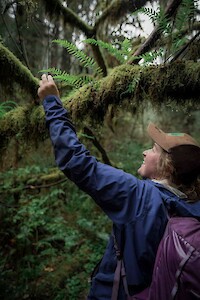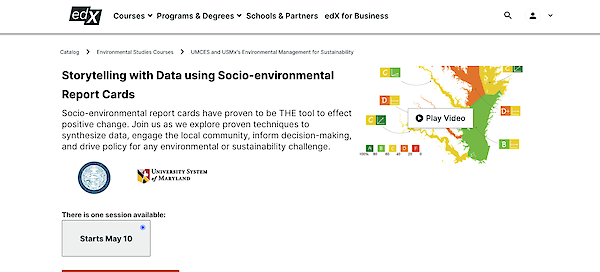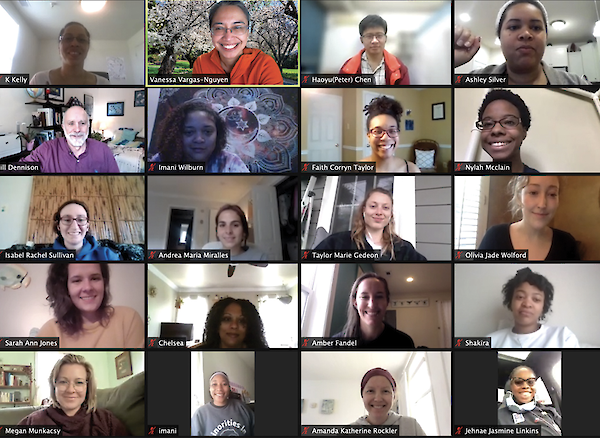Welcome, Crystal!

The newest addition to our team is Crystal Nichols, who joins us as an intern working remotely from southern Oregon. Crystal attended Ball State University for her bachelor's degree in aquatic biology and fisheries, and Southern Oregon University for her master's degree in environmental education. She will work with IAN video team members to create and edit video modules for various exciting projects. When Crystal is not working, she spends as much time as she can outside, trail running, kayaking, and snorkeling in beautiful Oregon rivers.
Online courses available: become an environmental steward

In mid-February, we launched the first course, Strategic Communication for Sustainability Leaders, in the Environmental Management for Sustainability professional certificate program on edX. On April 26, we are excited to launch the second course in the certificate, Storytelling with Data Using Socio-environmental Report Cards. Join the more than 900 learners that are currently enrolled in these two courses, and consider becoming a verified learner to gain access to additional content and to earn a professional certificate. For more information, visit our certificate page on EdX.
Professional Certificate in Environmental Management for Sustainability courses

We are excited to announce that our Storytelling with Data Using Socio-environmental Report Cards course will be live this upcoming Monday, May 10th! This is our second course in the Professional Certificate in Environmental Management for Sustainability. Pro tip: consider enrolling as a verified learner to have access to bonus materials and extra resources.
Socio-environmental report cards have proven to be THE tool to effect positive change. Enroll here today, and join us as we explore proven techniques to synthesize data, engage the local community, inform decision-making, and drive policy for any environmental or sustainability challenge.
Developing an Environmental Justice Index

A conceptual framework for an Environmental Justice Index for the Chesapeake Bay watershed was developed through a graduate course in the Marine Estuarine Environmental Science (MEES) program held last Spring 2021 and taught by Dr. Bill Dennison and Dr. Vanessa Vargas-Nguyen. Graduate students came from various Maryland universities, including the University of Maryland College Park, University of Maryland Center for Environmental Science, and the University of Maryland Eastern Shore. In this course, students, instructors, and staff engaged with subject matter experts to establish potential indicators and thresholds in various aspects of environmental justice from existing publicly available data and literature. Examples of potential indicators include proximity to hazards, access to green space, management and governance, and restoration funding. Preliminary results were presented during the Chesapeake Bay Program STAC meeting and three listening sessions with select stakeholders were held. Outputs from the class included a series of student blog posts, a summary video, and a newsletter.
Developing a framework for an Environmental Justice Index in the Chesapeake Bay Watershed

Environmental justice requires providing fair treatment and meaningful involvement of all people, regardless of race, color, national origin, or income, with respect to the environment. The Marine, Estuarine, & Environmental Science graduate program within the University System of Maryland sponsors a suite of unique Issue Study Group courses in which students, faculty, and staff from a variety of campuses collaborate to develop tangible products. This newsletter summarizes the findings of a course entitled “Developing an Environmental Justice Index for the Chesapeake Bay Watershed Report Card,” conducted in spring 2021. In addition to this newsletter, blog posts were written and a video was produced.

